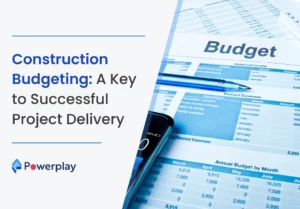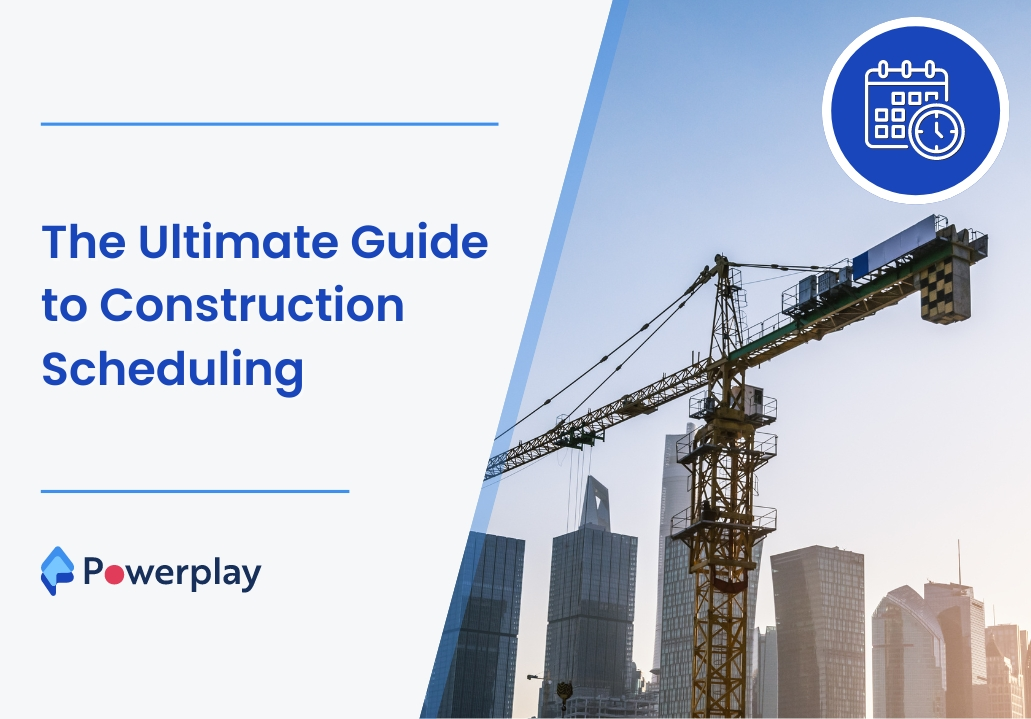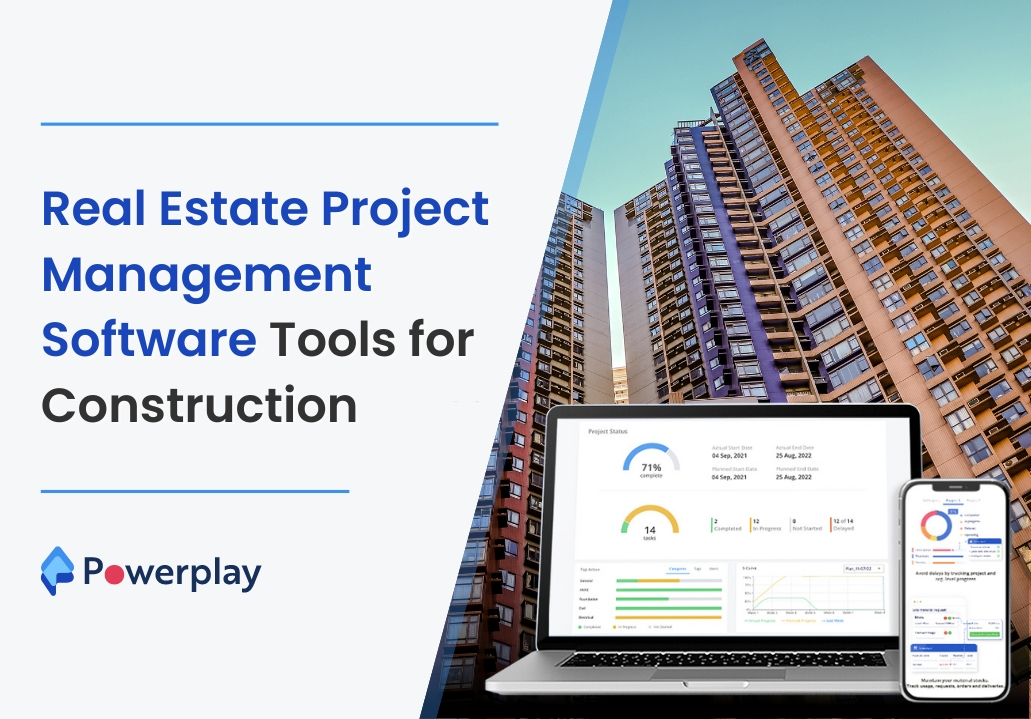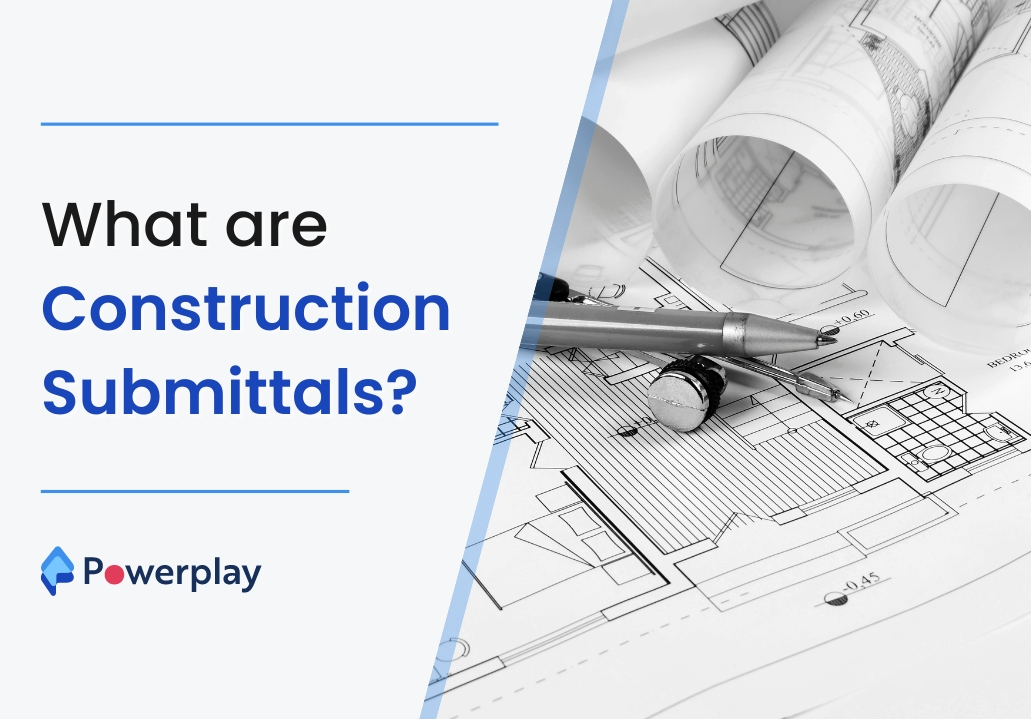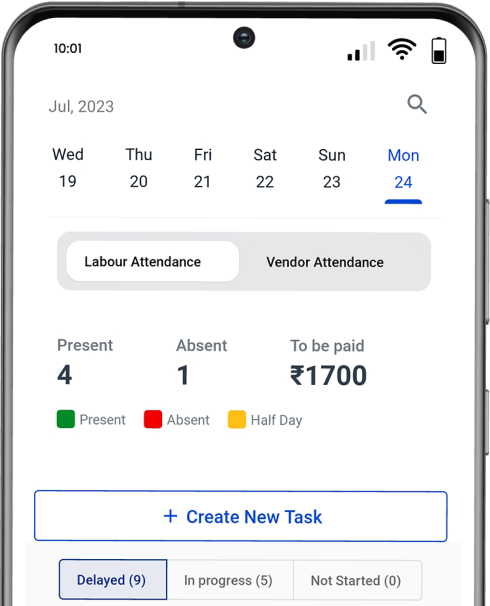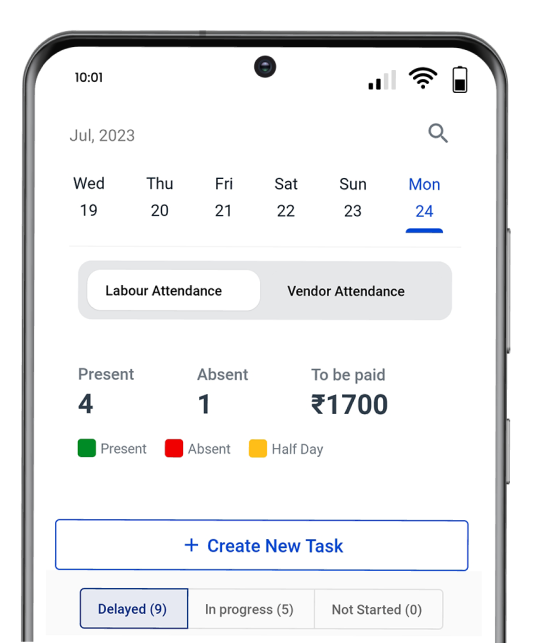Top 12 Ways to Improve Cash Flow in Construction
-
Kumar Abhishek Anand
- April 3, 2024

Cash flow is like oil to smoothly run the engine of the construction industry. Without construction cash flow, the owners will never be able to buy materials or pay labourers and the entire process of construction can stop. Construction owners collect money from clients based on project progress, hence has high vulnerability.
In this blog post, we will get into the depth of construction cash flow, why it is important, how to calculate it, and some command mistakes to avoid. We will also explore 12 powerful strategies to ensure a healthy and smooth construction cash flow to keep the project on track and the construction business profitable.
Table of Contents
ToggleWhat is Cash Flow?
Cash flow is a critical measure in any business. It is the money or cash equivalents transferred into and out of a company at any time. Positive cash flow means that companies have more money than they have liabilities. It allows them to keep their books updated and pay their monthly bills. On the other hand, those with negative cash flow don’t have enough money to pay their monthly bills.

Negative cash flow can indicate financial problems that could lead to the downfall of a company. It can be challenging to do this, but there are strategies that construction and contracting companies have to get from losses to gains.
Net Profit vs. Cash Flow
While both cash flow and net profit are equally critical for the financial health of the construction business, it is easy to get confused between the two. Net profit is overall revenue minus the total expense (during a specific period). On the other hand, Construction cash flow is the amount of money moving in and out of the company. You may still have a positive net profit and still struggle financially if your cash flow is negative. This happens when your expenses are due before you receive payments for completed work.
Why Is Cash Flow In Construction Important?
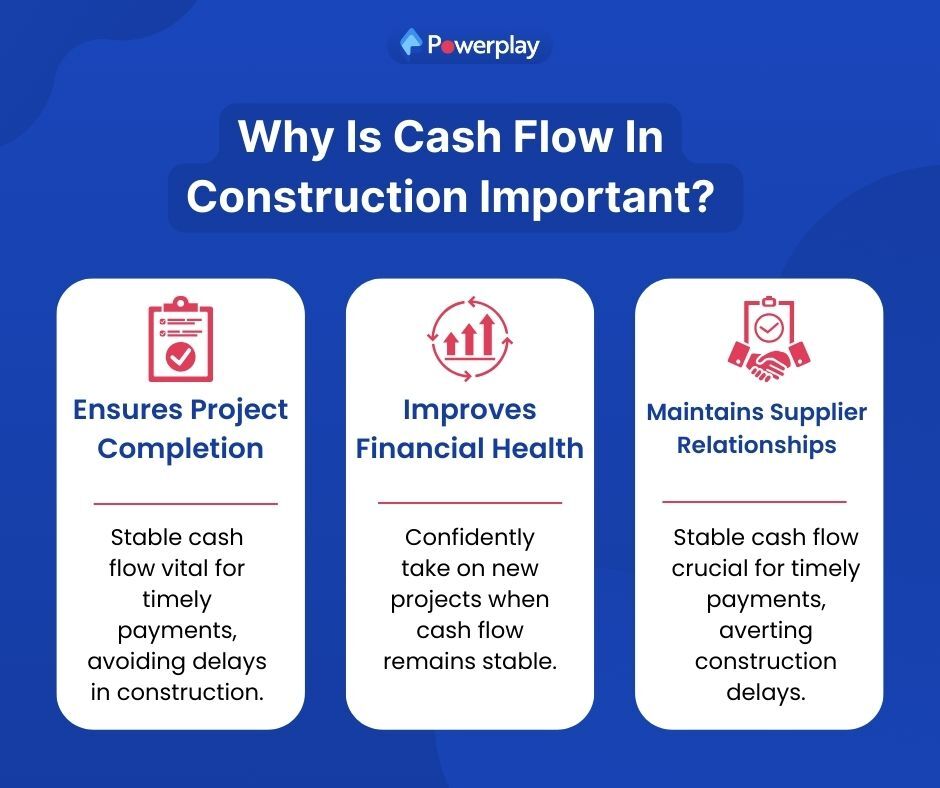
Having an effective and positive cash flow is extremely critical for several reasons, and below are the top 3 reasons why cash flow is important in construction:
Ensures Project Completion
As stated earlier, the entire project construction can come to a halt if the cash flow isn’t maintained well. Getting predictability and visibility of cash flow helps you pay all your bills/dues on time and avoid delays due to material and labour shortages. It also aids you in meeting the payroll obligations.
Improves Financial Health
You can take on new construction projects will 100% confidence only if your construction cash flow is on track for existing projects or the company at large.
Maintains Good Supplier Relationships
A positive construction cash flow will aid you to pay all your vendors and supplier bills on time which will build trust for future collaborations.
Overall, positive cash flow will ensure smooth project execution
How To Calculate Construction Cash Flow
Have you been calculating construction cash flow the right way? Here is the basic formula for your quick reference:
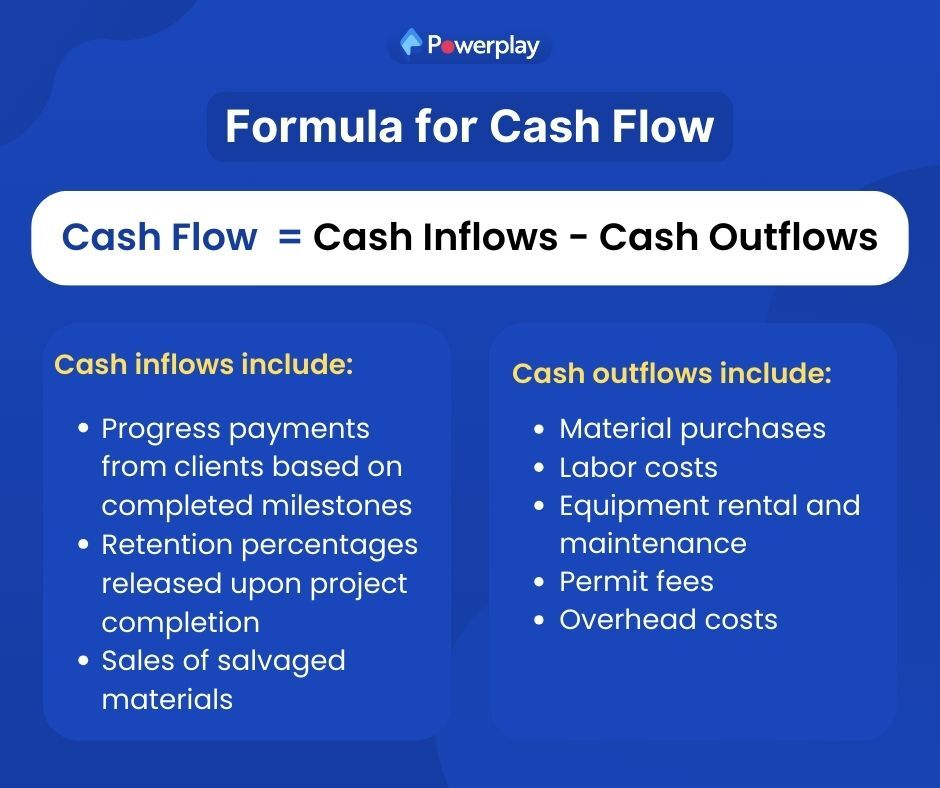
Cash Flow = Cash Inflows – Cash Outflows
This has to be a positive value for your business to run smoothly
Cash inflows include:
- Progress payments from clients based on completed milestones
- Retention percentages released upon project completion
- Sales of salvaged materials
Cash outflows include:
- Material purchases
- Labor costs
- Equipment rental and maintenance
- Permit fees
- Overhead costs
How To Conduct a Cash Flow Analysis
Analysing cash flow helps you identify potential shortfalls and surpluses, allowing you to plan mitigation strategies. Creating a detailed forecast of your construction project’s inflows and outflows over time is what constitutes the cash flow analysis. Factors like project schedule, anticipated material costs, and payment terms are the few factors that you must consider during the cash flow analysis.
Top 7 Cash Flow Issues In Construction
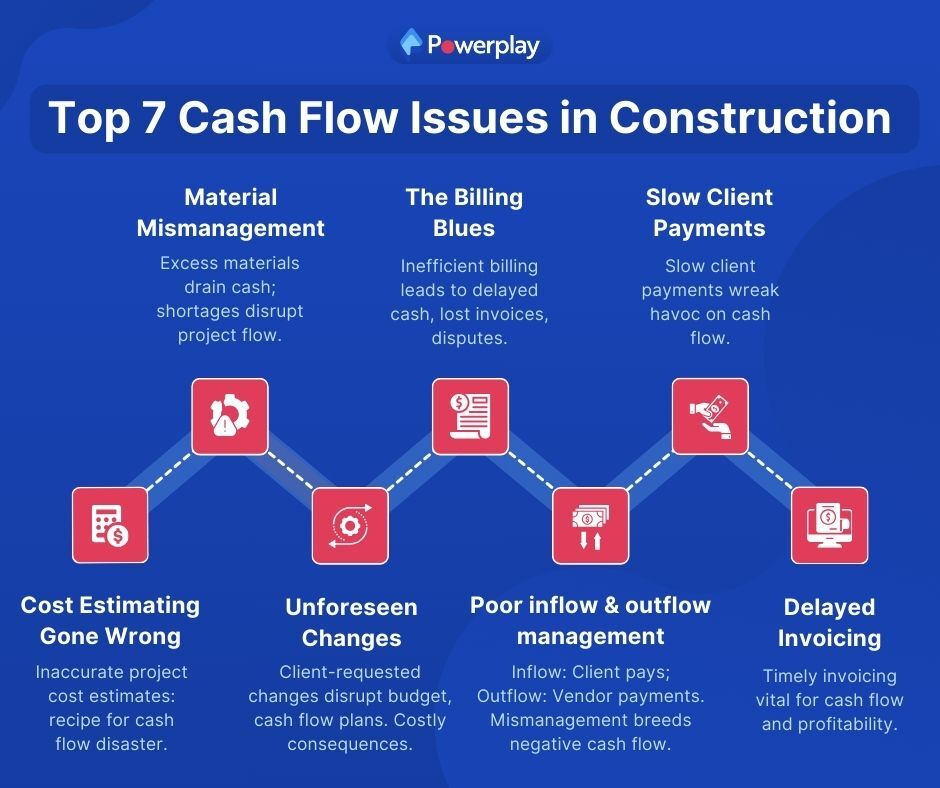
Running against the current is what keeping your construction cash flow healthy looks like. Material costs, labour expenses, and the forever threat of project delays impact the cash flow in the construction industry. Let’s explore the top 5 cash flow issues that plague construction projects:
1. Material Mismanagement:
Overstocking materials can tie up your cash flow unnecessarily. Conversely, running out of critical materials can lead to project delays and disrupt your cash flow rhythm.
Solution: Adapt just-in-time inventory management. Develop a procurement plan based on the project schedule and material needs. Negotiate flexible return policies with suppliers whenever possible.
2. The Billing Blues:
Inefficient billing practices can lead to delayed inflows of cash. Invoices might get lost, disputes might arise, and clients might simply drag their feet on payments.
Solution: Streamline your billing process. Utilise clear and concise invoices with detailed breakdowns of work completed. Implement a follow-up system to ensure timely payments. Consider offering early payment discounts to incentivise prompt payment.
3. Slow Client Payments:
This is a big one. Clients with slow payment habits can be a nightmare for your cash flow. Net 30, 60, or even 90-day payment terms can leave you waiting for weeks or even months to receive payment for completed work.
Solution: Always negotiate for better payment terms upfront. Secure progress payments tied to specific milestones and minimise retention percentages held by the client until project completion.
4. Cost Estimating Gone Wrong:
Inaccurate project cost estimates are a recipe for cash flow disaster. Underestimating material costs, labour hours, or unforeseen project changes can leave you scrambling to cover unexpected expenses.
Solution: Implement strict cost controls. Regularly monitor project expenses and identify areas for savings. Utilise historical data and industry benchmarks to create more accurate estimates.
5. Unforeseen Changes:
Unexpected changes requested by the client mid-project can throw your budget and cash flow off track. These changes often require additional materials, labor, and time, all of which come at a cost.
Solution: Clearly define the change order process in your contract. Document all changes meticulously and obtain written approval before proceeding. Negotiate fair compensation for additional work involved.
6. Poor inflow and outflow management:
Generally, cash inflow is when you get the amount from the client, and cash outflow is when you pay your vendors. Poor management of inflow and outflow timing results in negative cash flow. Many company pays bill before they get paid by customer and that is a bad practice to follow.
- Delayed invoicing:
Raising invoices in time is crucial in order to maintain cash flow. Keeping a track of raising invoices on time is extremely important otherwise the business can suffer a great negative cash flow and also financial loss at large.
Top 12 Strategies To Improve Cash Flow in Construction
1. Future Cash Flow
It’s not easy to project your cash flow in the future. Construction is more complicated than in other industries due to the different levels of jobs and change orders for current projects. Cash flow management software is one way to achieve this. Construction companies can use these tools to get an idea of the income and expenses they will see in the future. You can avoid these events by planning in advance.
2. Payroll Management: How to Approach it Correctly
Construction is not like most businesses. Construction workers are paid almost every other week. Subcontractors can be hired to improve cash flow. They are often paid every four weeks. It would be best if you did not do this in any particular circumstances.
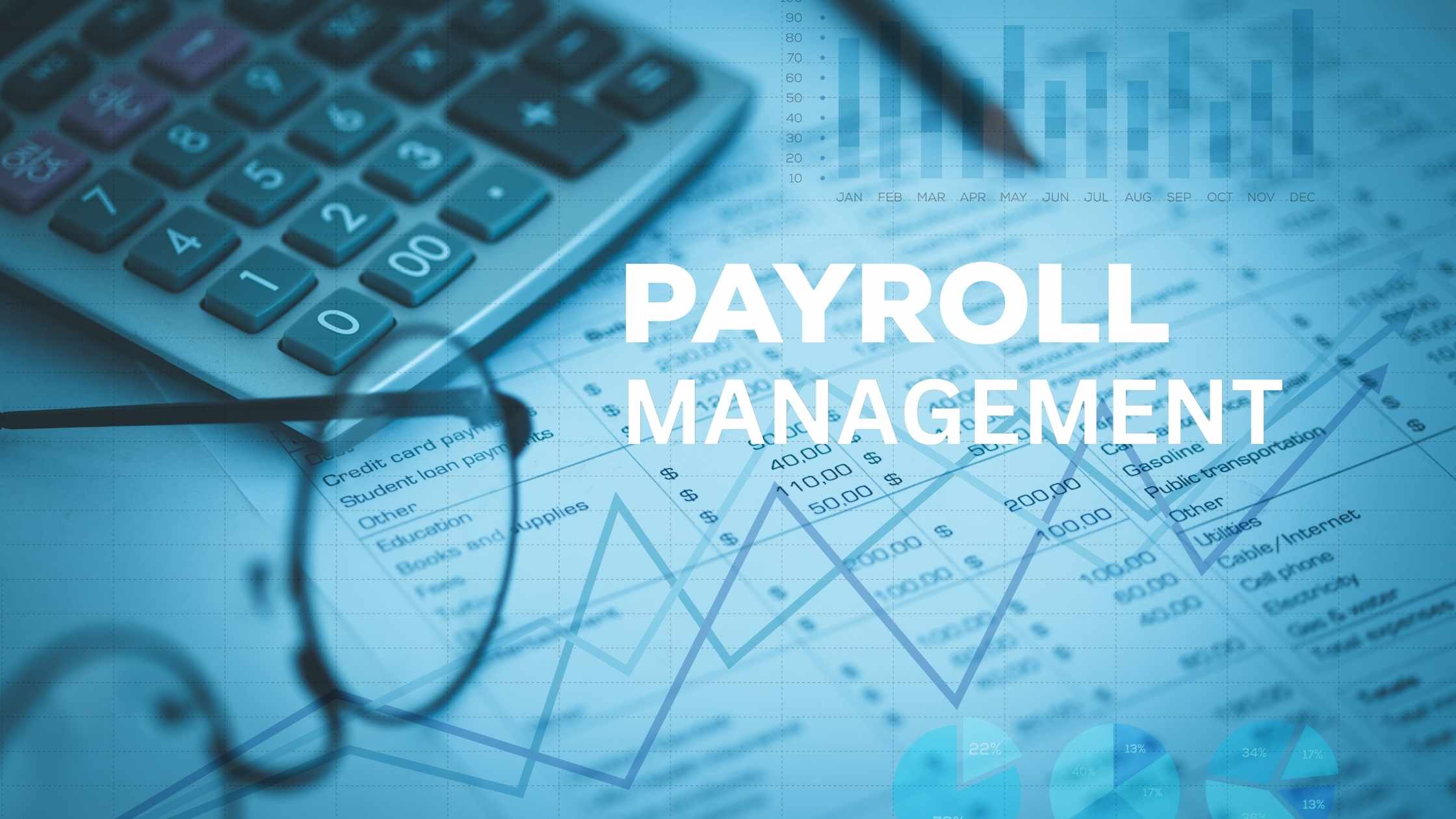
Permanent, full-time employees will deliver better results. Higher-quality work can reduce the chances of project setbacks or accidents and increase the likelihood of repeat business, referrals and new clients.
3. Spread the cost for better cash flow
It would be best if you never used cash to purchase materials and supplies unless you receive a significant discount. These purchases should be financed instead. Many suppliers offer financing options for contractors, including credit cards, lines of credit, and loans. You will still be responsible for interest and finance charges.
You won’t have to pay the entire amount outright, but you can make regular payments. You’ll have more cash available to allow your business to continue its operations. You may even be able to deduct the interest and other fees from your business expenses.
4. Get the best prices
To ensure you get the best price, comparing suppliers is always a good idea. Every supplier wants to win your business. A supplier will likely offer you the best deal if they know that you are looking for the best deal. You’ll save money by lowering your costs.
You can boost your cash flow by shopping around for the best deals on supplies and materials. Just remember to finance your purchases, not pay with cash.
5. Fast Change Orders
Construction is prone to change orders. These orders are often caused by a project requiring more time, money, or resources than expected. Extreme weather can also play a part. Instead of waiting for the project to be completed, the project manager should immediately process a change order. This will have a positive impact on cash flow.
6. Send automated invoices immediately.
Invoicing can be time-consuming. They are an essential part of your cash flow. Although you can still write your invoices manually, it’s better to use software to simplify your work. All invoices should be sent electronically and promptly. Invoices sent ahead of schedule will help maximise your cash flow potential.
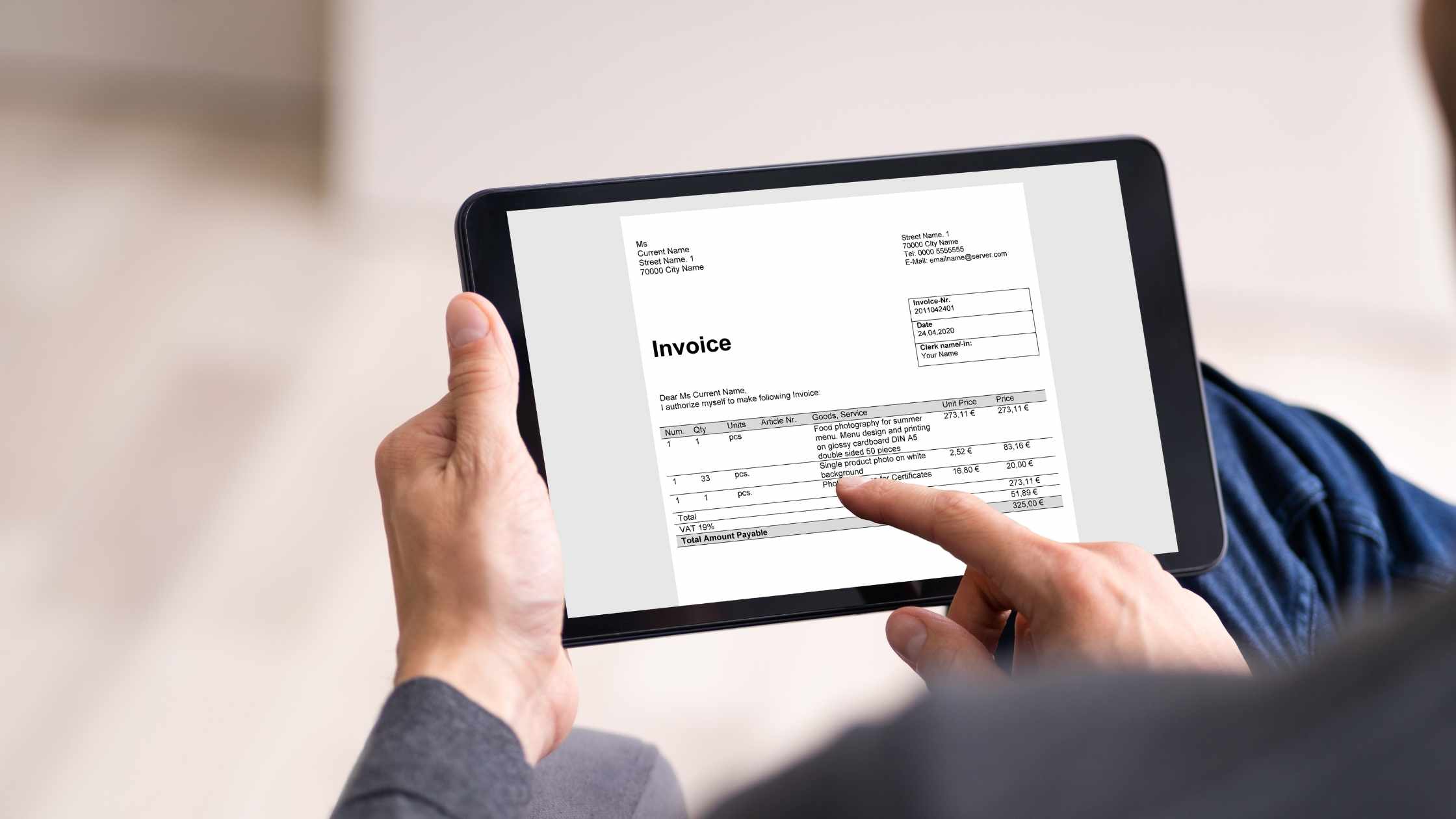
7. Accept electronic payments
Cash is the king of payments, but your business should also accept electronic payments. This will ensure that your business gets paid quicker, increasing cash flow and allowing for more capital to be used in day-to-day operations and payables, as well as growth.
8. Training the Project Manager in Cash Flow Management
Cash in construction is about 85% generated by project work in progress. This means that cash flow performance depends on cash flow management. You can also offer training and an incentive package based on cash flow performance. This is highly likely to work.
9. Avoid over- and underbilling
Overbilling is a favourite pastime of some project managers. This means the invoice will be more than the job has been completed, increasing the current cash flow. It will also reduce cash flow after the project is completed. Companies that underbill clients hit their cash flow in the short term. What’s the best way to go? It is best to bill according to the amount of work done.
10. Aim for outstanding day sales
A goal can significantly increase your chances of success. It takes between 60 to 90 days to get paid for construction. It is worth setting a realistic goal of reducing that time to 50 days. This can be done by immediately sending invoices, offering payment incentives, writing clearly defined terms, checking credit reports before making any deals and restructuring terms with nonpayers.
Because no project is the same, construction companies are different from other businesses. To improve cash flow, you need to use different strategies. The ability of the project manager to manage cash flow will play a significant role. This is why it is essential to hire a qualified project manager or offer cash flow management training to current project managers. Construction companies should have the best project management and do all they can to improve the speed of receivables, which will increase cash flow.
11. Talk to your suppliers and vendors
They might be willing to give you a discount (lower price) if you buy a lot of things at once (bulk purchase) or pay them upfront in cash. Being good friends with your suppliers can also help. By offering them something they want, your construction company can save money on materials.
12. Late payment fees
If customers pay you late, it can hurt your cash flow and make it hard to pay for other projects. It’s like an extra cost of doing business. To avoid this, put a penalty (like a late fee) in your contracts if customers don’t pay on time. This way, everyone knows the rules upfront.
Conclusion
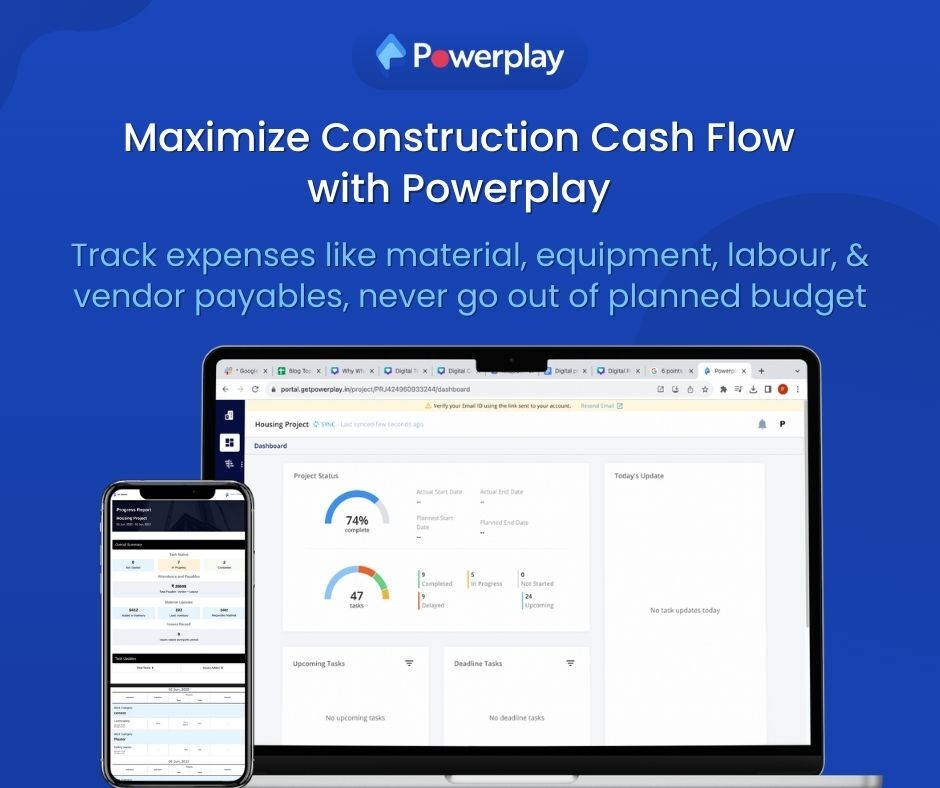
To run a forever smooth construction business and project, construction owners must prioritise their constriction cash flow management. Having clear visibility on cash flow will not only help them gain and maintain financial stability but also boost your business for long-term success in the construction industry. By making use of the above-mentioned top 10 strategies to improve your construction cash flow, you can take a proactive approach to enabling a healthy cash flow which is vital for building a thriving construction business.
You can use Powerplay, a construction management software to track your expenses like material, equipment, labour, and vendor payables, giving you a clear picture of cash outflow. By using Powerplay’s expense management feature you can assign project budget and make sure that all spends are tracked on the app so that you never go out of planned budget and you have a healthy cash outflow. Other features like real-time tracking and automated reports will provide you with accurate project and financial details so that you can make informed decisions faster. Powerplay is available on Android, iOS, and the Web.
Share
Kumar is a digital content professional with more than 2 years of experience in Blog writing, copywriting and scripting. His passion lies in the art of creating convincing content that plays a major role in converting leads for SAAS businesses.

